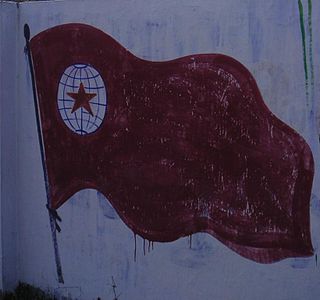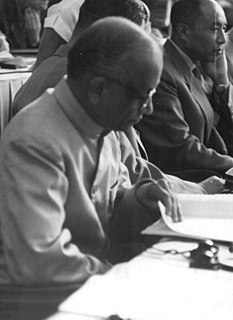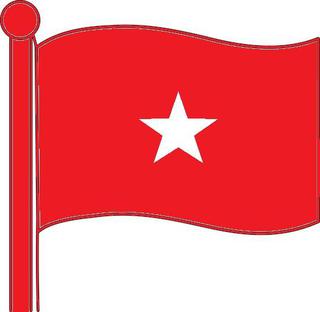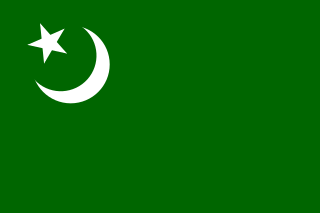
Elamkulam Manakkal Sankaran Namboodiripad, popularly EMS, was an Indian communist politician and theorist, who served as the first Chief Minister of Kerala state in 1957–59 and then again in 1967–69. As a member of the Communist Party of India (CPI), he became the first non-Indian National Congress chief minister in the Indian republic. In 1964, he led a faction of the CPI that broke away to form the Communist Party of India (Marxist). He completed his graduation from St. Thomas College, Thrissur.

Left Democratic Front (LDF) is a coalition of left-wing political parties in the state of Kerala, India. It is one of the two major political coalitions in Kerala, the other being the United Democratic Front each of which have been in power alternatively for the last two decades. LDF won the May 2016 election, and is now in power. The coalition consists of Communist Party of India (CPI), Communist Party of India (Marxist) and variety of other smaller parties.

Janathipathiya Samrakshana Samithy is a political party in the Indian state of Kerala. The party was formed in 1994 when the CPI(M) leader K.R. Gowri Amma was expelled from Communist Party of India (Marxist). She is the widow of the Communist Party of India leader T. V. Thomas.

The Communist Party of India (Marxist–Leninist) Liberation is a communist political party in India.

Communist Marxist Party is a political party in Kerala, South India. The party was founded in 1986 when Communist Party of India (Marxist) leader M. V. Raghavan was expelled from the CPI(M) due to a grave difference of opinion regarding the formation of alliances with the Muslim League. His support for forming a united front with non-secular parties such as the Muslim League in order to take on alliances led by the Indian National Congress was ultimately rejected by the CPI(M) leadership. He was subsequently expelled from the Party.

Revolutionary Socialist Party (RSP) is a political party in India. The party was founded on 19 March 1940 and has its roots in the Bengali liberation movement Anushilan Samiti and the Hindustan Socialist Republican Army. The party got around 0.4% of the votes and three seats in the Lok Sabha elections in 1999 and 2004. It is part of the Left Front (Tripura).
The United Democratic Front (UDF) is an alliance of political parties in Kerala state, India, created by the prominent Indian National Congress (INC) party leader Shri. K. Karunakaran in the 1970s. Since its formation, the coalition has sustained itself on support from different social, caste and religious groups as a powerful bloc to take on the Communist Party of India (Marxist) led Left Democratic Front (LDF). This alliance is led by the INC party in the state of Kerala. In the 2016 Legislative assembly elections UDF just won 47 out of 140 seats and hence lost the power again to Left Democratic Front. Later in August 2016 KC(M)Kerala Congress (M) left the alliance. In January 2018 Janatha Dal(United) left the alliance from UDF. In 2018 Kerala Congress (M) made a re-entry to the front.

Shripad Amrit Dange was a founding member of the Communist Party of India (CPI) and a stalwart of Indian trade union movement. During the British Raj, Dange was arrested by the British authorities for communist and trade union activities and was jailed for an overall period of 13 years. After India's Independence, a series of events like Sino-Soviet split, Sino-Indian war, and the revelation that while in jail, Dange had written letters to the British Government, offering them cooperation, led to a split in the Communist Party of India, in 1964. The breakaway Communist Party of India (Marxist) emerged stronger both in terms of membership and their performance in the Indian Elections. Dange, who remained the Chairman of the CPI till 1978, was removed in that year because the majority of party workers were against Dange's political line of supporting Indian National Congress, and Indira Gandhi, the then Congress Prime Minister. He was expelled from the CPI in 1981. He joined the All India Communist Party (AICP), and later, United Communist Party of India. Towards the end, Dange got increasingly marginalised in the Indian Communist movement. He was also a well-known writer and was the founder of Socialist the first socialist weekly in India. Dange played an important role in the formation of Maharashtra state.
Socialism in India is a political movement founded early in the 20th century, as a part of the broader Indian independence movement against the colonial British Raj. The movement grew quickly in popularity as it espoused the causes of India's farmers and labourers against the zamindars, princely class and landed gentry. Socialism shaped the principal economic and social policies of the Indian government after independence until the early 1990s, when India moved towards a more market-based economy. However, it remains a potent influence on Indian politics, with a large number of national and regional political parties espousing democratic socialism.

The Bolshevik Party of India is a communist political party in India. The party was founded in 1939. The party had a certain role in the trade union movement in West Bengal and was briefly represented in the state government in 1969. In later years the party has played a negligible role in Indian politics.
Kasaragod is a Lok Sabha constituency in Kerala.

The first legislative assembly Election to the Madras state on the basis of universal adult suffrage was held in March 1952. This was the first election held in Madras state after the Indian Independence. This election was officially known as 1951 Madras State Election, even though through delays, actual voting didn't take place until early 1952.

Ezhu Kudikkal Imbichi Bava (1917–1995) was an Indian politician and a leader of the Communist Party of India (Marxist) and the best-known politician to come from the municipality of Ponnani. He was member of the Rajya Sabha and the Lok Sabha, both the houses of Parliament.
The politics of Tripura, a state in Northeast India, has been dominated by the Communist Party of India (Marxist), the Indian National Congress and the Bharatiya Janata Party. As of 2019, the Bharatiya Janata Party (BJP) is the ruling party in the states's legislative assembly, while the Communist Party of India (Marxist) candidates won the two parliamentary constituencies in 2014 Indian general election.

The Kerala Legislative Assembly election of 1967 was the fourth assembly election in the Indian state of Kerala.
Saptakakshi Munnani or the United Front was a short-lived alliance of seven political parties in Kerala state, India, which won the 1967 Kerala Legislative Assembly election. It was led by the Communist Party of India (Marxist) and the other parties in the coalition were Communist Party of India (CPI), Revolutionary Socialist Party (RSP), Indian Union Muslim League (IUML), Indian Socialist Party (ISP), Kerala Socialist Party (KSP) and Karshaka Thozhilali Party (KTP). The coalition had a comfortable majority of 117 members out of 133. E. M. S. Namboodiripad was sworn in as the Chief Minister for the second time on March 6, 1967. But even before completing 30 months, internal dissensions surfaced and the government fell 32 months after assuming power, on October 24, 1969. Following this, the CPI, RSP, IUML and ISP exited from the coalition and constituted a mini-front.
United Front or Aikya Munnani was a coalition of political parties in Kerala state, India, which was the ruling combine in the state from 1970 to 1979. The front was formed by five political parties, viz. Communist Party of India (CPI), Indian National Congress (INC), Revolutionary Socialist Party (RSP), Indian Union Muslim League (IUML) and Praja Socialist Party (PSP), immediately before the 1970 Kerala Legislative Assembly election. The alliance saw the inclusion a few other parties in the following years. United Front dissolved in 1979 after the constituent parties left the alliance in order to form new political alliances, viz. the Left Democratic Front and the United Democratic Front.














